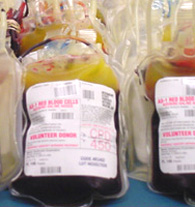The US Food and Drug Administration has reaffirmed its 1983 prohibition on gay men donating blood. The policy was implemented to prevent the spread of HIV through transfusions when the AIDS epidemic began in the United States and blood tests were still rudimentary and prone to error.

In March 2006, the groups sent a proposal to replace the lifetime ban with one-year deferral following male-to-male sexual contact.
Experts from these blood centers have assured FDA about the advanced technology that has come up for testing HIV virus or any other serious disease. With the help of strict testing methods any kind of deformity in the blood can be figured out.
Under current procedures, all men are asked to declare if they have had sex, even once, with another man since 1977. Those who say they have are prohibited from donating blood. Anyone who has used intravenous drugs or been paid for sex is also permanently barred from donating blood.
The drug agency says those men are at increased risk of infection by H.I.V., which can be transmitted by blood transfusion.
New and improved tests, which can detect HIV-positive donors within just 10 to 21 days of infection, make the lifetime ban unnecessary, the blood groups told the FDA.
In a document posted Wednesday, the FDA said it would change its policy if given data that show doing so wouldn't pose a "significant and preventable" risk to blood recipients.
The FDA said HIV tests currently in use are highly accurate, but still cannot detect the virus 100 percent of the time. The estimated HIV risk from a unit of blood is currently about one per 2 million in the United States, according to the agency.
The ban on gay and bisexual men donating blood has since been lifed in Italy, Sweden, South Africa, Portugal and Spain. Australia only bans donations from people who have had gay sex in the last year while the Netherlands is reviewing their blanket exclusion of gay men. The Swiss government has recommended that blood donor policy should be based on differentiating between risky and non-risky behaviour, regardless of sexual orientation.
